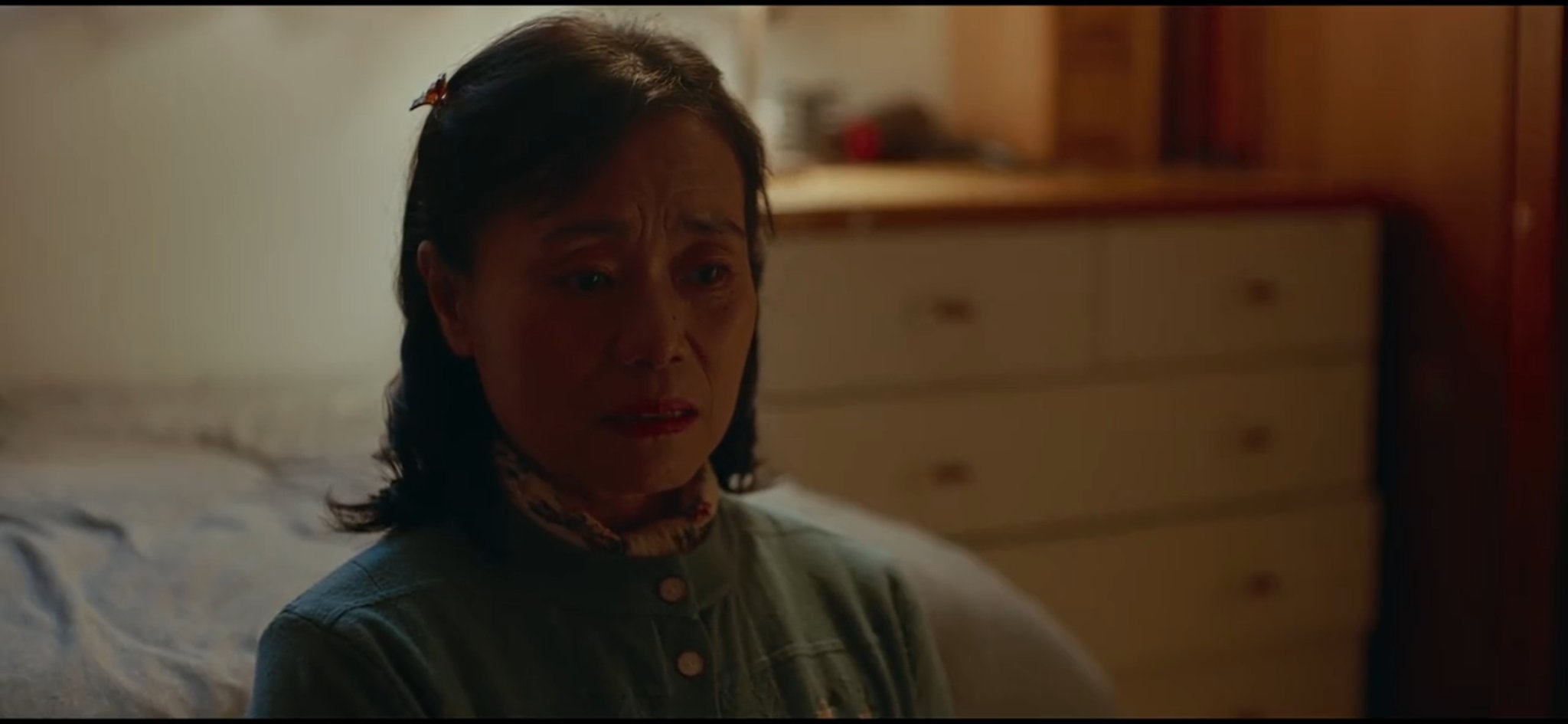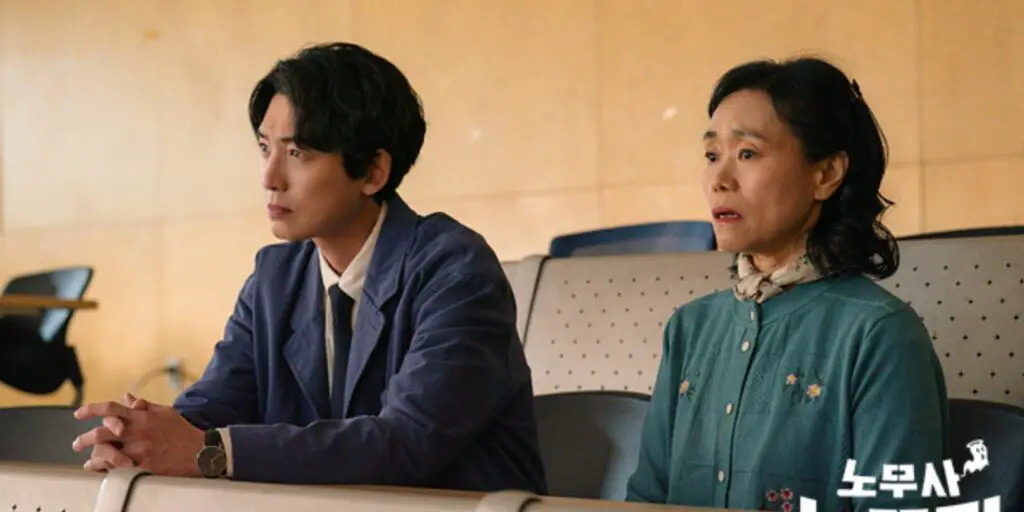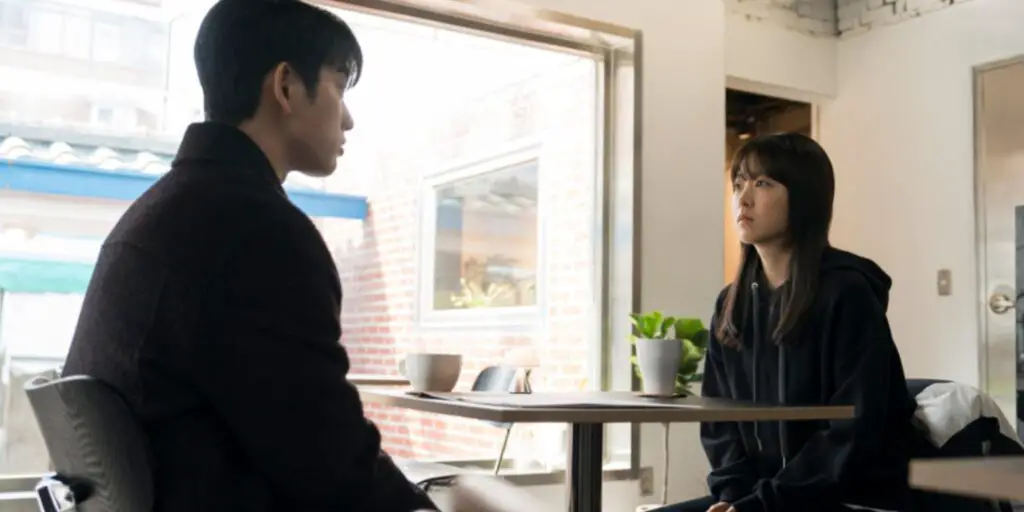In Oh My Ghost Clients Episode 5, which aired on June 13, things took a sharp turn. Noh Moo-jin, played by Jung Kyung-ho, was arrested by police while leading a protest. He had been helping university janitors fight against what looked like an unfair workplace practice — forced written tests under pressure.
Earlier in the episode, Moo-jin was shown talking to a woman who had entered the house with his mother, Yang Eun-ja (played by Jeon Gook-hyang). But things turned strange. His mother didn’t recognize the woman. Moo-jin quickly realized the woman wasn’t alive. She was a ghost. That moment hit hard, especially when the ghost wouldn’t speak.
He tried asking questions. Who are you? Why are you here? What happened to you? But she said nothing. Moo-jin, frustrated and overwhelmed, asked if she had anything to say at all. He even wondered if she came because of the dog his mother once cared for.
Confused and uneasy, he turned to his mother. He asked if she knew anyone who had died recently. Yang Eun-ja mentioned a co-worker named Young-sook. They had worked together as university janitors about 10 years ago. That name stuck with Moo-jin.
Later, Moo-jin secretly followed his mother to her job. He saw janitors, including his mother, being pushed to take a written test. It was supposed to be a “regular cultural test,” but the atmosphere was tense. Moo-jin sat next to Young-sook (played by Kang Ae-sim) during one of the flashbacks. She looked extremely nervous. She even held her chest, clearly stressed.
System’s Cruelty
Young-sook’s ghost doesn’t wail or beg. She simply appears — silent, solemn. Her presence asks a chilling question: What happens to the ones the system breaks quietly? This wasn’t a horror twist. It was grief personified.
Turns out, Moo-jin once designed the test himself. It was part of a plan to reduce staff and save on operating costs. It wasn’t about skill & was a tool to filter out workers. When Moo-jin confronted his mother about it, she said she never told him because it was embarrassing. She spoke plainly — older workers were doing their best not to get fired. They dressed up and studied hard for exams that weren’t meant for them. She said Young-sook had also gone through that.
Not long after the exam system began, Young-sook stopped coming to work. Worried, Yang Eun-ja visited her and found her lifeless body at her desk. She had died while studying. Her heart gave out, but it wasn’t just a medical issue. It was stress. Moo-jin realized that the ghost was Young-sook. She had returned, not for revenge, but for recognition.
Key Themes in Episode 7
-
Bureaucratic cruelty masked as “policy”
-
The silent suffering of older, invisible workers
-
Guilt and complicity in systems we once helped create
-
The human need for dignity — even in death
-
Protest through stillness, not noise
Young-sook’s story may be fictional, but it mirrors real issues in Korea’s labor scene. In recent years, university janitorial staff in Seoul and Busan protested similar exam requirements used to quietly cut jobs. These so-called “training assessments” often pressure older workers into quitting — without any official layoff. The drama taps into that reality with empathy and urgency.

After understanding the truth, Moo-jin couldn’t ignore it anymore. He shared everything with Na Hee-joo (Seol In-ah) and Go Gyeon-woo (Cha Hak-yeon). The three of them visited the university. They met the administrator in charge of the tests. The response? Cold and shameless.
Ethical Dilemmas and Silent Resistance
Moo-jin isn’t just reacting to injustice — he’s facing himself. He once created the very policy that harmed these workers. Episode 7 is his moral reckoning. He’s not just fighting the university. He’s fighting the version of himself that thought numbers mattered more than people.
The administrator insisted the test was “just job training.” He even dared Moo-jin to name the person who told him it was unfair. His tone was dismissive, his attitude rigid. The group then spoke to other janitors. Surprisingly, many didn’t voice strong complaints. Go Gyeon-woo noted that the working conditions were not the worst. But Moo-jin couldn’t let go of the testing system. Na Hee-joo pointed out that making people take tests wasn’t technically illegal.
The show challenges us with a hard truth: just because something’s legal doesn’t mean it’s ethical. When Moo-jin chooses civil disobedience, it’s a reminder that change often starts where the law ends — in personal responsibility and moral action. That gave Moo-jin an idea. If the test isn’t illegal, refusing to take it isn’t illegal either. That was his answer. A peaceful refusal. No violence. Just standing firm.
Soon after, Moo-jin led a peaceful rally in front of the university. He was joined by janitors, including a beautician. They stood silently. They weren’t shouting or causing trouble. But the school staff didn’t like it. They asked for names. They tried to intimidate the group. Things escalated quickly. Police showed up. Moo-jin didn’t back down. Instead, he stood quietly, refusing to leave. And just like that, he was arrested. It shocked everyone.
The episode highlights the silent breakdown of people by systems, including long hours, pressure, and fear of being fired. It also addresses the unfair treatment of lower-tier university workers. The drama raises questions about why janitors are tested like students, who benefits from these exams, and how many Young-sooks are pushed to the edge. Go Gyeon-woo’s response of intentionally failing the test was powerful, suggesting that failing or refusing to take the test could be the strongest message.

Should You Watch Episode 7?
Definitely — especially if you’re the type of viewer who appreciates social commentary wrapped in emotional storytelling. It’s not flashy, but it hits deep. Episode 7 proves this drama isn’t just about laws. It’s about the people those laws forget.
This drama doesn’t just show legal fights. It puts a spotlight on invisible workers & tells stories of people like Yang Eun-ja and Young-sook. It doesn’t try to wrap things up with easy solutions either. Oh My Ghost Clients episode 5 lets viewers sit with the discomfort. By the end of the episode, viewers are left wondering — what now? Will Moo-jin’s arrest stop the protest? Or will it push the story even further?
Moo-jin’s arrest could mark a turning point. Will other staff join in? Will the media take notice? And can Moo-jin continue his fight from behind bars? Episode 7 leaves us with more than just questions — it hands the moral baton to the audience. Did this episode hit you emotionally? Do you think Moo-jin did the right thing by standing still? Share your thoughts in the comments.
Your Turn, Chingus!
What did you think of this episode? Any favorite scene or line? Drop it below
Kavita Mishra is a dynamic writer and passionate Korean entertainment enthusiast, combining her love for K-pop and K-drama with a flair for storytelling. With a keen eye for the latest trends, Kavita crafts articles that capture the pulse of K-pop idols, chart-topping hits, and the most buzz-worthy dramas taking over screens worldwide.
How Does this Article Make You Feel?


